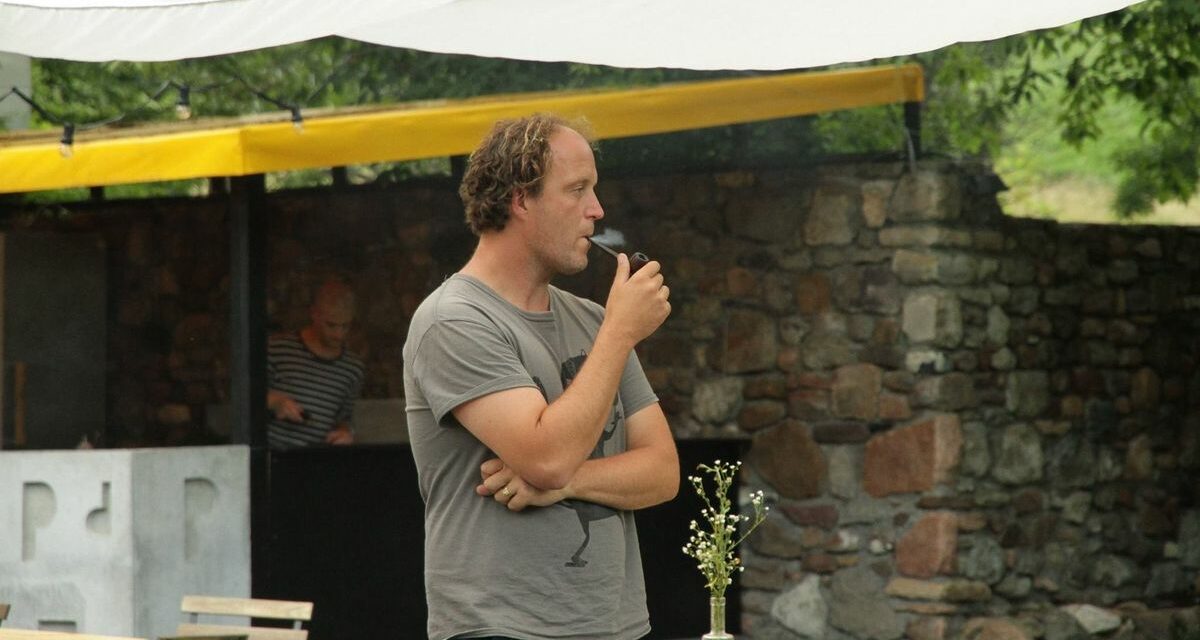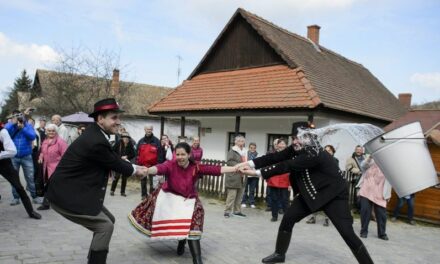If something comes into our possession that is not originally ours, that we just laid eyes on, that we just wanted, it does not become ours even if we take it.
I'm going home to Trianon, I told a friend this afternoon. We sat in the stands of the soccer field in Kismaros and watched our children play in the hot sun for about an hour and a half. They can still handle it, we can handle it less, or rather not at all.
I wonder what else can be said or written about Trianon, this friend of mine asked.
What else is there that hasn't been said or written a hundred times already. I have no idea, I told him. I really had no idea, and still don't. On the way home, I ran into a Gypsy man from Nagymaros in front of the liquor store. I've known him by sight for a long time, his whole family is a florist. He was still standing there with a bunch of tulips in his hands. I'll give it all to you, brother, I can't do anything with them anymore, I'm going home, he said when he saw me. He gave the bunch of tulips and started towards the train station. I was standing there with the industrial amount of tulips that I had to somehow take home by bicycle. The locals looked on as I balanced the many tulips on the handlebars of my bicycle on the way home. He must have done something very dirty at home, if he wanted to appease his wife with so many tulips, they might have thought.
Obviously, I will be a "holiday prom", but this is hard to avoid. If I were to use the pathetic register that I have read and heard many times, I would feel it to be false, if I were to take it all ironically, that would also be a mistake. Is there even a proper language when talking or writing about Trianon? One hundred and three years later, what can be said about this? Of course, you can say a lot of things, and you can also write a lot of things. Trianon has a huge literature, but to be honest, this literature is of little interest to me. Not that it doesn't have valuable pieces. Are. I know quite a few emblematic works of this literature.
The last time I trianoned myself was when I was walking in Magas-Börzsöny.
We made our way to the top of the mountain called Nagy-Mána, and on the ridge I received an SMS informing me that they were welcoming me to Slovakia. Anyone who lives around here and is used to wandering in the mountains often receives this kind of text message. Once upon a time, I made a joke about this to the caretaker of the key house in Nagyirtáspuszta. We were standing on the bridge over the stream, smoking cigarettes, and suddenly I asked him if he knew that Börzsöny was annexed to Slovakia. He looked at me confused. It was annexed this morning, I told him, and the people living in the affected area were notified via SMS that the annexation had taken effect. I showed him the text message as proof. I haven't forgotten his horrified look ever since.
But this story in itself may seem like blasphemy to many. Can you joke about something like that? Can Trianon be made into a joke? I think it can. The absurd as a genre permeates the twentieth century history of the Carpathian Basin. The absurd and the tragedy are our two defining historical genres. It's very hard to think of something that hasn't already happened in one way or another. Béla Hamvas writes that there is only one effective defense against the demon: you have to laugh. The method works, I checked several times. Trianon can be thought of as a kind of demon.
As a demon that has been rotting the air here for a hundred and three years.
Because it really sucks, let's have no doubts about that. But it also rots the air of those who feel at the mercy of the demon. Of course, they think that their air is not rotten, but that should be their problem. It would be possible to list a few facts here. It could be said that the cities of the territories annexed after Trianon were scattered, from Kassa, Nagyvárad, Cluj, etc. they basically made a fool of themselves, and the Hungarians living in the annexed areas were constantly terrorized mentally and physically.
Can you say that? May. Is this true? True. Anyone who says otherwise is lying.
Among other things, the demon can be recognized by the fact that it deceives its victim. One by taking him into his good graces, the other by torturing him. He tortures whomever he accepts as he tortures. You can't make a good deal with the demon, no matter what, it's beyond our minds anyway. Romanian, Ukrainian, Slovak, Serbian, Croatian, Austrian and Slovenian as well, not just Hungarian. Named nations (with the exception of the Hungarians) have been living in the belief that so-called history has served them justice for one hundred and three years. That they got what they deserved, because lo and behold, there is still justice on Earth. You could envy them for that.

Photo: MTI/Gyula Czimbal
But it can be good to live in the belief that the goddess Iustitia heard their complaint and took appropriate action. On the other hand, for one hundred and three years, the Hungarian nation has lived in the belief that so-called history has played tricks on it, that there is no truth on Earth, because if there was, none of this could have happened. Named nations (with the exception of the Hungarians) have been basking in the happy satisfaction of fulfilled revenge for one hundred and three years. Opinions are divided as to why they had to take revenge, but we can only say that it may be some kind of mythical, irrelevant feeling, nobody remembers the supposed reasons, but nobody cares.
Facts never mattered here, they didn't kick the ball, because the demon doesn't work with facts in the first place.
The demon frees emotions, helps the dark instinctive world to shine. He prompts from the dark and says many things that no one would dare to say on their own. He says for us all that we are too cowardly to say. But his real goal is that not he, the demon, but we ourselves finally say it, and not only say it, but also act on everything that we have finally said. Named nations (with the exception of the Hungarians) have done all this. True, they would not have been able to do this on their own. Fortunately for them, so-called history was on their side. He heard their immeasurable complaints and tried to remedy them to the best of his ability. The operation was successful, triple hooray, let the champagne pop, let the fireworks crackle.
But something is wrong with this. The hoped-for radiant golden age of Arcadia did not materialize for some reason. If we look at the nations that should have become Arcadia after gaining their rightful place, we see everything but Arcadia. Do we see happy countries? Prosperous, prosperous states? No. But why not? What could be the reason that the glorious operation apparently did not bring the much-desired Canaan? Maybe it wasn't just a scam? Jesus, it would be bad to even think about it.
Is it conceivable that these states have been led astray? That there were small print parts of the business contract they signed that they didn't read carefully in their excitement?
There were, we can be sure of that. We do not know the lowercase parts literally, but we can roughly understand their content. There was something in them that stealing the territories of a neighboring country, intimidating, terrorizing, berating and humiliating the native population of these territories is a great pleasure, but unfortunately comes with a heavy price.
If something comes into our possession that is not originally ours, that we just laid eyes on, that we just wanted, it does not become ours even if we take it.
It is in vain that we invade with an army, it is in vain that we install our officials in the place of the old ones, it is in vain that we plant our flags everywhere. It doesn't work that way, I'm very sorry. The heavy price is that we know all this, but from now on we have to pretend we don't. We pretend, we play roles, but the reality is that we don't have a single quiet moment anymore. The soul is slowly poisoned, and despite everything, somewhere deep down, something keeps poking us. We always feel only this pricking, which makes us nervous, we see horrors, and when someone speaks to us, we cringe. They say our conscience will be bad. And a person with a bad conscience slowly eats himself up, is swallowed up by a vortex of obsessive thoughts, in vain he tries to justify himself at every level. There was something like that in the small print of the contract, but those small print parts were written by the demon in invisible ink. Although he could have written in plain sight, the people involved would not have read it even then in their great heat.
Ultimately, I feel sorry for them, and I say this without any irony.
It can't be easy to live like this, I wouldn't wish it on my enemies either. The thing is, they've been beaten, that the demon has been holding its belly from laughing for a hundred and three years. This laughter has been echoing in the Carpathian Basin since then, and can be heard clearly on quiet nights. He laughs at them, the unlucky couples who thought they had made a good deal, and He laughs at us, no less unlucky, because we believe we have lost something that really can never be lost.
Two spruce trees grow in our garden. I brought them from the Low Tatras a few years ago, from the Ördöglakodalma Pass. They are growing nicely, they barely fit in their pots anymore. They should be planted slowly. By the time they grow up, I hope, by some miracle, this laughter will die for good. But I believe in miracles less and less.
Featured image: Ákos Győrffy's Facebook page













